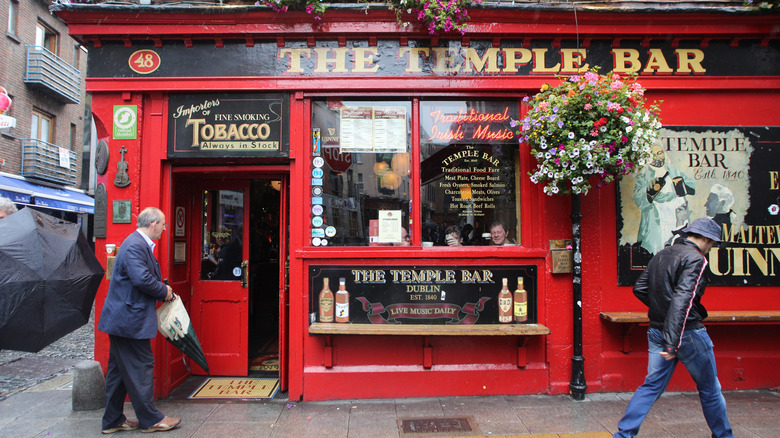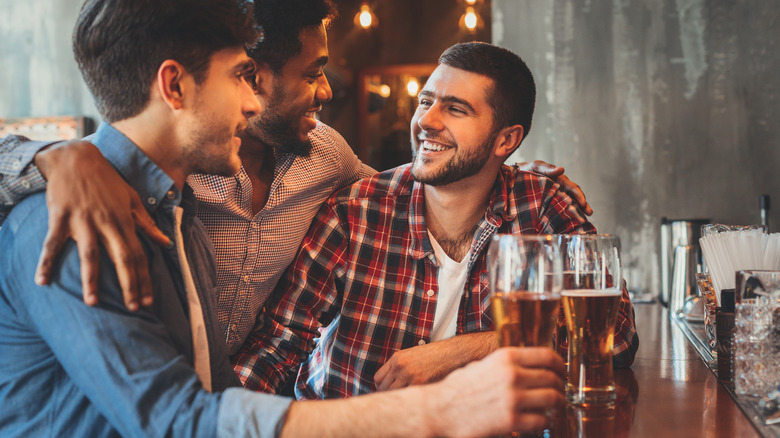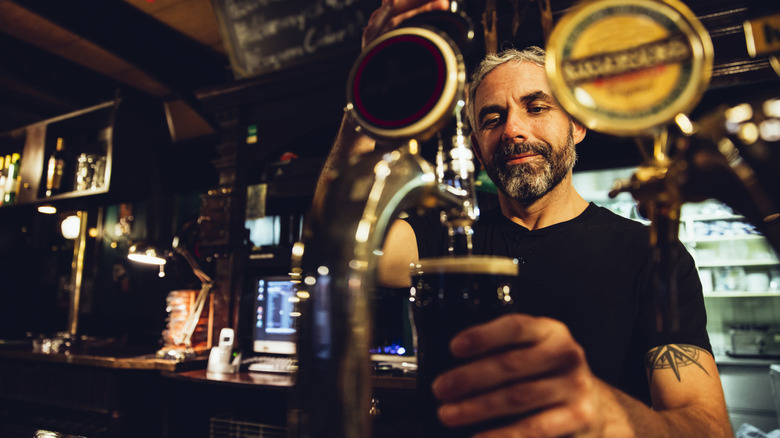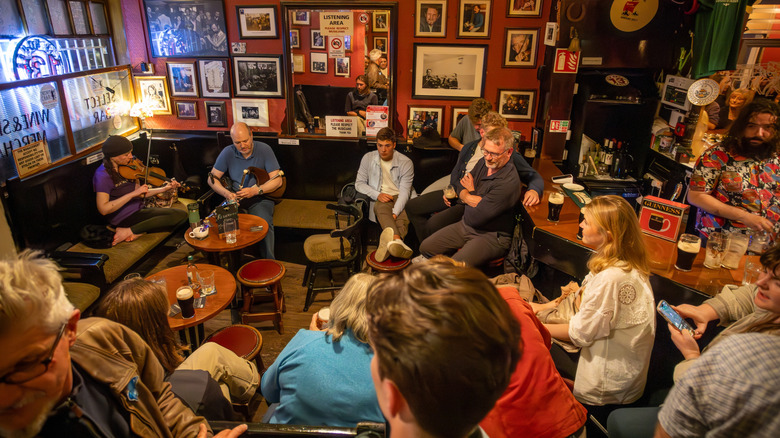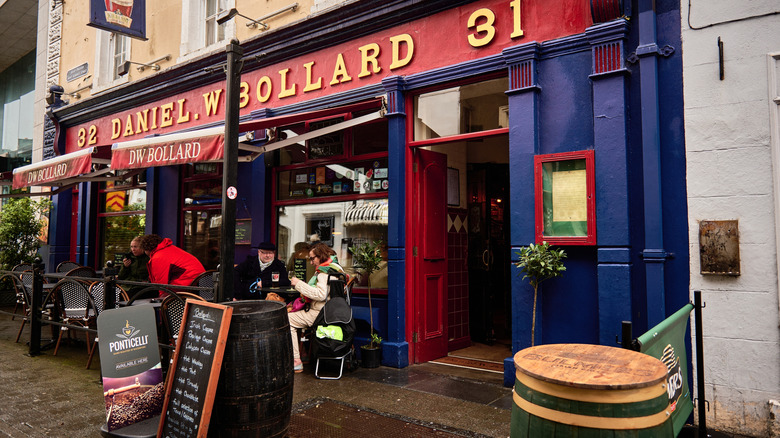The Essential Rules Of Pub Etiquette That You Need To Know Before Drinking In Ireland
Can you consider a trip to Ireland complete without having had a proper Guinness — which tastes better here than anywhere else in the world — at an authentic Irish pub? Whether you find yourself at the iconic Sean's Bar (the world's oldest bar and a beloved Irish gem) or the humble neighborhood establishment around the corner, pubs are embedded in the social and cultural fabric of the Irish, the backdrop for special events, football finals, first dates, and after-work get-togethers. But tourists eager to partake in this quintessential Irish experience may be blissfully unaware that Irish pub culture goes by a string of unwritten rules and traditions.
From how to buy drinks (or rounds) for your fellow pub mates to the accepted rules of tipping and ordering, we give you a rundown on the essential rules of pub etiquette that will hopefully avoid any social faux pas on your first night out in an Irish pub. Feeling overwhelmed? Don't be. Drinking is only one part of the Irish pub's equation; what really completes a night out is the promise of a good time (or "craic," as it's referred to). The Irish are a friendly folk and will most likely strike up a conversation with you, so lean into the spirit of craic and jump head first into the local pub culture with an open mind. As travel guru Rick Steves writes in his blog, "You're a guest on your first night; after that, you're a regular."
Know the ins and outs of the Irish round
The "round" system is a tradition where everyone takes turns buying the entire group a drink. Consider yourself drafted into a round when you're presented with a drink, and know that the expectation is that you stay until you get your turn at buying a round for the others as well. Timing is a delicate matter in the round system: Offer a round before your drinking mates have drained their glasses (ideally when glasses are about two-thirds empty), and remember that offering your group a bag of potato chips (crisps), peanuts, or any kind of bar snacks will put you in everyone's good graces. Tactfully keep up with the drinking pace of others so the group collectively segues to the next round.
If you don't plan to stay for long, or if you can't cover the cost of a round for the whole group, let the others know beforehand. If you wait to opt out, you may be labeled a "round dodger" by your new Irish buddies. For non-drinkers, have no fear. You can still participate in rounds with a non-alcoholic drink that's similarly priced to what the others are drinking. Though non-alcoholic canned drinks have been around for some time, some Irish pubs have introduced zero-alcohol Guinness on draught to the non-drinking patrons, which fosters a more inclusive pub experience.
Ordering etiquette in an Irish pub
In Irish pubs, it's customary to make your way to the bar and place your order. You may have to nudge your way through a crowd to get to the bar, and once you're there, getting the bartender's attention is another matter. Queues are virtually non-existent in pubs, though the bartender will do his best to honor the first-come, first-served rule. As the night progresses into a busier, rowdier, and noisier atmosphere, try positioning yourself as close to the bar as possible to place an order. Once you get your order, don't nurse your drink by the bar. Leave the bar space so others can order their rounds once you've received yours.
Try to catch the attention of your bartender in the most courteous yet assertive way you can, without crossing the line to obnoxiousness. Take the word of Dublin pub Brannigan's, which has been operating since 1854: "The bar staff are the gatekeepers to liquid happiness. Avoid waving money around like a semaphore, and instead, use subtle cues like a nod or a raised finger to signal your order. And never interrupt an Irishman mid-story — especially if he's an old-timer with a designated seat at the bar."
Never hurry a pint of Guinness. A Guinness pour is a two-step ritual, and like all rituals, it must be treated with reverence. The first pour takes up half of a glass tilted at a 45-degree angle, followed by a minute or two of letting it rest before it's filled up to the brim. Payment up front is the standard procedure as opening a tab isn't the norm in Irish pubs (though regulars could be exemptions to this rule). If you've got your heart set on opening a tab, especially if you're with a big group, it wouldn't hurt to ask, however.
Navigating music and conversation in the pub
You'll most likely encounter a live musical performance by traditional musicians in an Irish pub, which contributes to the delightful craic. Proper etiquette calls for listening to and applauding the live entertainment, though you can still carry on conversations with your party, albeit at a lower volume. The atmosphere can turn lively, and some performers can rope the crowd into a sing-along, or even a bit of traditional Irish dancing, which the locals are eager to teach to those that are keen (or tipsy enough) to learn.
In the spirit of conviviality, be prepared to share a table with other patrons, especially when it starts to get crowded. While an unoccupied seat may seem like winning the Irish pub jackpot, it's in good form to ask the people nearby if the seat is free. Some people don't, and Redditor u/NahinSpecial expresses frustration at this sort of behavior: "Dont hog the table i.e. 6 people sitting at a big table hovering around a half a guinness for 2 hours. You probably don't but I have seen a lot of this in a [pub] thats popular with locals and tourists. No one will say anything but it can be frustrating." And what's the protocol for an empty table with coasters or napkins placed over beer glasses? Steer clear of it, as this indicates that its occupants will return shortly.
While Americans are known to easily connect with strangers, they can also be quite loud — unexpected traits Europeans always notice about American tourists. When diving into conversations with locals, be mindful of your volume and respectful of the cultural and social contexts; asking if leprechauns are real or if they've ever found a four-leaf clover may not be the greatest conversation starter.
Tips and dress codes are optional in Irish pubs
Unlike the United States where tip fatigue is real, Ireland is a country where gratuities aren't expected but are certainly appreciated. If you're grabbing dinner in a pub, 10% or 15% of your bill is a sufficient amount to tip your server. When paying for pub rounds, you can simply round your bill up to the nearest euro, leaving the change as a tip to the barman at the end of the night. Another custom you don't have to worry about are dress codes, which aren't typically enforced in Irish pubs. People in fancier outfits could be celebrating an event or grabbing pre-drinks before heading over to a club or restaurant, but local pub-goers will more likely than not be in casual attire.
It's easy to lose track of time in a pub's warm and buzzy ambiance, but you'll know it's time to wrap up the night when overhead lights are flashed or bells are rung — the universal signals for patrons to place their last orders and settle any pending bills. However, the night could stretch even longer for a chosen few invited to a lock-in, which is when the pub continues to operate behind closed doors. Regulars or close friends of the bartender or pub staff usually get to experience these lock-ins, though even some Hollywood celebrities have reportedly been invited to partake in this cheeky after-hours event. Pubs have enforced official closing times, but lock-ins operate on the premise that once a pub is closed to the general public, it's viewed as private property.
